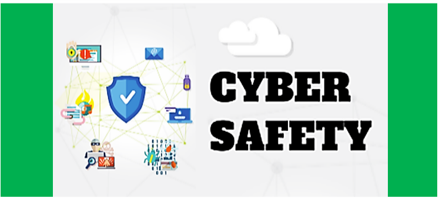
One topic that has become increasingly important in recent years is cyber safety and digital literacy. During the COVID-19 pandemic, remote learning became increasingly common, leading to a rise in the usage of computers and phones. With schools shut across the world, millions of children had to adapt to new types of learning. As the pandemic began to wane and educational institutions started to reopen, children returned to schools. However, the increased use of digital devices continued even after schools reopened. As a result, it is more important than ever to be aware of common cyber threats and take appropriate measures to protect oneself.
In today’s digital age, it is essential for students to be equipped with the knowledge and skills to navigate the online world safely and responsibly. The National Commission for Women has initiated a ‘Digital Literacy & Online Safety Programme’ for college/university students in collaboration with Facebook and Cyber Peace Foundation. The program aims to train 60,000 women in universities across major cities of India regarding safe use of the internet, social media, and email. It will enable them to differentiate between credible and questionable information available online.
Digital literacy is more than just being able to use technology; it involves understanding how to use it effectively and responsibly. The Central Board of Secondary Education (CBSE) has released a Handbook on Cyber Safety for students that aim to comprehensively cover all aspects of literacy and safety.
In addition to these initiatives, it is important for schools to incorporate digital literacy and cyber safety into their curriculum. This can be done through classroom lessons, workshops, and seminars. Teachers must also be trained in digital literacy so that they can effectively guide their students.
The importance of digital literacy extends beyond just cyber safety. It also includes understanding how to effectively communicate online, how to evaluate the credibility of information found on the internet, and how to use technology to enhance learning.
As technology continues to evolve, it is essential for students to be equipped with the knowledge and skills to navigate the online world safely and responsibly. By incorporating digital literacy and cyber safety into the curriculum, schools can help prepare their students for the future.
Cyber safety and digital literacy are essential skills for students in today’s digital age. Schools have a responsibility to incorporate these topics into their curriculum and provide their students with the knowledge and skills they need to navigate the online world safely and responsibly.
It is important for schools to take a proactive approach when it comes to cyber safety and digital literacy. This means not only incorporating these topics into the curriculum but also providing ongoing support and resources for students.
One way that schools can do this is by establishing a cyber safety team or committee. This team can be responsible for developing and implementing cyber safety policies, providing training and resources for students, and monitoring online activity within the school community.
Another way that schools can support their students is by providing access to resources such as online safety guides, tutorials, and educational videos. These resources can help students learn about topics such as online privacy, cyber bullying, and responsible social media use.
In summary, cyber safety and digital literacy are essential skills for students in today’s digital age. Schools have a responsibility to incorporate these topics into their curriculum and provide ongoing support and resources for their students. By taking a proactive approach, schools can help prepare their students for a safe and responsible online experience.
JUL
2023
